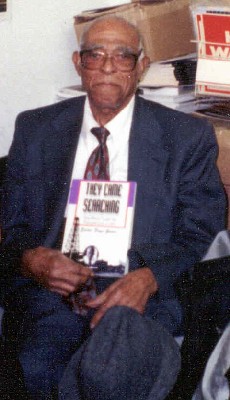To keep apprised of current activities please go to the the John Hope Franklin Center for Reconciliation.
Kinney I Booker, Tulsa, Oklahoma, b. March 21, 1913
 At the time of the Tulsa Race Riot of 1921, my parents, my brother, sister, and I lived at 320 North Hartford. We had a lovely home, owned by my parents, filled with beautiful furniture including a grand piano. That beautiful home with the elegant furnishings, and all our clothes and personal belongings were burned up during the riot.
At the time of the Tulsa Race Riot of 1921, my parents, my brother, sister, and I lived at 320 North Hartford. We had a lovely home, owned by my parents, filled with beautiful furniture including a grand piano. That beautiful home with the elegant furnishings, and all our clothes and personal belongings were burned up during the riot.
My Dad, Hood Booker, was born in Greenfield, Texas but came to Oklahoma to get in on the oil boom business. Actually, very few blacks became oil barons. Most did the next best thing. They worked for white oil barons. That is what my Dad did. He got a job working as chauffeur for a prominent white Tulsa oilman named Wilcox who had an office building downtown on Sixth Street. Mr. Wilcox had a yacht and spent summers with his family in Michigan. He would take Dad with him to Michigan for Dad had one of the sharpest minds, when it came to mechanical or engineering-oriented things, of any man I know. Mr. Wilcox felt that way about Dad, too. Once, while Mr. Wilcox was sailing his yacht on Lake Michigan, the yacht developed mechanical problems. When his fancy engineering expert couldn't fix it, Mr. Wilcox turned to Dad and said 'Hood, do something with it.' Dad fixed the ailing yacht! I have had to fight bitter feelings about the way blacks were treated then. They did not have opportunities to develop their talents to their fullest extent. My Dad was a mechanical genius. He could have been another Thomas Edison if he had had a chance. America did not nurture its black citizens then. But that's another story. Now back to the day of the riot.
Early on the morning of June 1, 1921, My parents were awakened by the sounds of shooting, the smell of fire, and the noise of fleeing blacks running past the house. My Dad had awakened us children and sent us to the attic with our mother. We could hear what was going on below in the house. We heard Dad pleading with mobsters who had broken into our house.
We could hear him begging, 'Please don't set my house on fire. Please don't burn my house.' But, of course, that is exactly what they did. We could smell the smoke. Dad pretended to leave the house and when the mobsters left after they had sprayed our house with gasoline or kerosene and set it on fire, Dad returned and rushed to the attic and rescued us. We joined the fleeing black refugees who were trying to get out of Tulsa to the safety of the countryside. What a pitiful bunch we were. In our nightclothes...barefoot....electric lines falling down around us...smouldering relics of once beautiful homes...the sight and smell of death and destruction all around us , there we were, men, women, children running like frightened animals fleeing a forest fire. We saw things that day that no human eye should ever see. My little sister's comment sears my soul to this day. She asked me, 'Kinney, is the world on fire?' I replied, 'I don't think so, but we're in a lot of trouble!' And, oh Lord, we black people of Tulsa were certainly in a lot of trouble that day. My family and the people who were fleeing with us were captured by the Guards and taken to a detention center, Convention Hall (now the Brady Theater). Mr. Wilcox?
After the riot, Dad rebuilt us a nice house, but to us, it was never as fine as that first house, and we sure did miss the elegant furnishings we had in that first house, especially that grand piano.
 Juanita Delores Burnett Arnold -- Home -- Binkley Wright
Juanita Delores Burnett Arnold -- Home -- Binkley Wright
 At the time of the Tulsa Race Riot of 1921, my parents, my brother, sister, and I lived at 320 North Hartford. We had a lovely home, owned by my parents, filled with beautiful furniture including a grand piano. That beautiful home with the elegant furnishings, and all our clothes and personal belongings were burned up during the riot.
At the time of the Tulsa Race Riot of 1921, my parents, my brother, sister, and I lived at 320 North Hartford. We had a lovely home, owned by my parents, filled with beautiful furniture including a grand piano. That beautiful home with the elegant furnishings, and all our clothes and personal belongings were burned up during the riot.